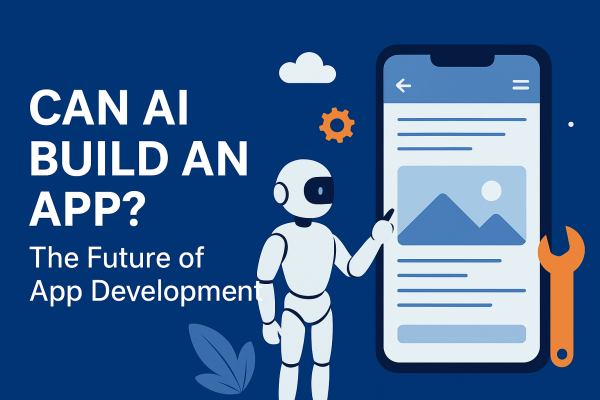Can AI really build an app all by itself?”
It’s one of the hottest questions buzzing around tech circles today — from developer teams to startup founders and boardrooms. With the rapid rise of tools like ChatGPT, GitHub Copilot, and low-code/no-code platforms, many are starting to wonder if we’re on the verge of AI taking over app development completely.
So, is AI the next big thing in app creation — or just another overhyped trend? Let’s find out.
The Big Hype vs. The Real Picture
Many believe that AI can build a full app from just a simple prompt — “Make me a shopping app with payments and login,” and boom, the code is done. Others think AI will soon replace developers entirely. Some even imagine a future where anyone, without a single line of coding experience, can launch the next unicorn startup — all thanks to AI.
Sounds exciting, right?
But here’s the truth — we’re not there yet.
AI is getting smarter, but it’s still far from building complex, production-ready apps without human help.
A recent METR study found that developers using AI tools like Cursor Pro and Claude Sonnet actually took 19% longer to finish their tasks.
Surprising, isn’t it? The perception that AI makes everything faster doesn’t always match reality.
What AI Can (and Can’t) Do in App Development
Let’s cut through the noise and look at what AI tools are actually capable of right now.
What AI Can Do:
- Generate and Suggest Code
AI tools like ChatGPT and Copilot can write code snippets, fill logic gaps, or even refactor sections of your code. But they still need a human to design the structure, manage architecture, and ensure everything works seamlessly.
- Create Basic UI Designs
AI can generate rough design mockups or transform text prompts into layout suggestions. It’s a great starting point, but fine-tuning a real user experience still needs a designer’s creative eye and testing.
- Support Low-Code and No-Code Tools
AI shines in helping non-developers use platforms like Bubble or Glide by automating tests or fixing syntax issues. But even then, complex apps require real developer oversight.
- Debug and Explain Simple Errors
AI can quickly detect missing semicolons or highlight unused variables — great for repetitive tasks. But when it comes to solving deeper architectural or performance issues, humans still lead the way.
- Enhance Learning and Productivity
AI is becoming a brilliant learning companion. Developers use it to explore new frameworks, generate test ideas, and speed up small tasks — freeing up time for creative problem-solving.
What AI Still Struggles With:
Building a full-fledged app isn’t just about writing code — it’s about strategy, design, scalability, and user experience. Here’s where AI falls short:
- Understanding Business Goals
AI doesn’t grasp business models, customer pain points, or long-term growth strategies. It follows commands but doesn’t “understand” the purpose behind them.
- UX/UI for Real Users
AI-generated designs might look neat but lack the nuance that comes from user research, feedback, and testing — things humans excel at.
- Handling Security & Integrations
Connecting third-party APIs, managing secure logins, and maintaining data privacy are critical — and risky. AI can write basic code but not guarantee compliance or safety.
- Database Design and Scalability
AI can suggest a schema, but it doesn’t plan for data growth or handle load balancing when your user base explodes from 1,000 to 100,000.
- Bug Fixing and Maintenance
AI doesn’t handle unexpected crashes or maintain long-term stability. Human developers still need to optimize, update, and debug real-world apps.
Common Issues When Depending on AI for App Building
Even when AI-generated apps look impressive, they often come with hidden problems:
- Broken logic in the backend
- No proper error handling or security measures
- Everything running on the client side (slow and unsafe)
- No planning for scalability or performance
- Outdated or incorrect coding practices
In short, AI can build a prototype, not a production app.
Why Developers Still Matter (And Always Will)
AI can assist with writing code, but developers do far more than that — they understand the “why” behind the product.
Developers:
- Solve real-world problems, not just technical ones
- Balance cost, scalability, and performance
- Ensure compliance, accessibility, and security
- Think creatively and collaborate across teams
Take this example:
If you’re building a healthcare app, AI might code the appointment booking system. But will it prioritize emergency slots? Follow HIPAA regulations? Prevent double bookings? No — those require human judgment and empathy.
AI: A Developer’s Smart Assistant
The future isn’t about AI replacing developers — it’s about AI empowering them.
AI will handle routine, repetitive work:
- Generating boilerplate code
- Writing unit tests
- Suggesting improvements
- Assisting with debugging
This lets developers focus on innovation, creativity, and strategy — the parts that truly drive product success.
As Adrian McKnight, Chief Digital Officer at WNS Global Services, puts it:
“Innovation is primarily a human skill. Too much reliance on AI is unlikely to deliver success.”
So, What’s Next?
Will AI ever build complete apps on its own? Maybe one day — but not yet.
Right now, we’re entering a hybrid era where human developers and AI collaborate. AI speeds up development; humans make it meaningful, ethical, and user-centric.
So, the real question isn’t “Can AI build an app?”
It’s “How can developers use AI to build better apps, faster?”
Because at the end of the day, the most powerful apps won’t just be AI-built — they’ll be AI-assisted and human-driven.

